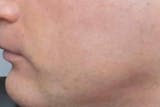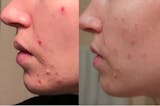Eczema flare-ups can be triggered by various environmental factors.
Read on for a comprehensive list of triggers, and some tips on how to manage them.
Eczema is a chronic skin condition characterized by periodic acute flares, marked by red, itchy, and inflamed skin. The severity and duration of an acute eczema flare are influenced by three main factors:
The environment around us is where we find most of our triggers and aspects of the environment can affect our skin barrier strength.
Understanding and managing the environmental triggers that can exacerbate the condition is crucial for minimizing flare-ups and maintaining healthier skin.
As each person's experience with eczema is unique, it's important to identify and avoid individual triggers to help reduce symptoms and improve overall well-being.
JUMP TO SECTION:
The Environmental Factors Affecting Eczema
Various environmental triggers and factors can contribute to eczema flare-ups. Here we will explore how chemicals found in household cleaners, personal care products, and clothing can exacerbate eczema symptoms, and discuss the impact of temperature, humidity, and air quality on skin health.
By understanding and addressing these environmental factors, individuals with eczema can take proactive steps to minimize their exposure to irritants and improve their overall skin condition. For advice on how to manage these potential triggers, see the trigger avoidance page.
Chemicals In The Environment
Household Products
Many household cleaning products, such as soaps, detergents, antiseptics, antibacterials, solvents, machine oils, cement, and chlorinated water, contain harsh chemicals that can irritate sensitive skin and worsen eczema symptoms.(NHS)(NEM 2022) Ingredients like ammonia, bleach, and sodium lauryl sulfate are known to be particularly irritating.
Some chemicals, like disocyanates in paints, coatings, and adhesives, can reduce the essential ceramides in the skin.(ZEL 2023)
To minimize exposure to these chemicals, consider using gentle, fragrance-free cleaning products, or try making your own natural cleaning solutions with ingredients like vinegar, baking soda, and essential oils.
Personal Care Products
Soaps, shampoos, and other personal care products can also be a source of irritation for those with eczema. Fragrances, certain preservatives, and synthetic dyes are common culprits.
Choose fragrance-free, hypoallergenic products specifically formulated for sensitive skin. Additionally, avoid using harsh exfoliants or scrubbing your skin too vigorously, as this can further damage the skin barrier and increase inflammation.
Chemicals In or On Clothing
Synthetic fabrics, such as polyester and nylon, may cause irritation, while residues from laundry detergents and fabric softeners can linger on clothes and come into contact with the skin.
Choose natural, breathable fabrics like cotton and bamboo, and wash clothes with fragrance-free, hypoallergenic detergents. Additionally, avoid using fabric softeners and dryer sheets, as they often contain skin-irritating chemicals.
Temperature & Humidity
Extreme temperatures and humidity levels can have a significant impact on eczema symptoms, making the skin more prone to irritation, itching, and inflammation. Let's delve deeper into how hot and cold weather, as well as varying humidity levels, can exacerbate eczema.
Hot weather and humidity:
- Sweating: During hot weather, the body sweats to regulate its temperature. However, sweat can also act as a vehicle for allergens and irritants present on the skin's surface, allowing them to penetrate deeper into the skin and potentially trigger an immune response or exacerbate existing eczema. Sweat also contains salt, which can sting and exacerbate eczema-prone areas, causing discomfort.
- Increased skin friction: Warmer temperatures may cause people to wear lighter, more revealing clothing, leading to increased skin-on-skin or skin-on-clothing friction. This friction can cause further irritation, especially in areas where eczema is already present.
- Higher humidity may result in prolonged contact between sweat and the skin, increasing the risk of irritation and itching.
- High humidity can lead to increased dust mites and mold.(ARL 2021)
Cold weather and low humidity:
- Dry air: Cold air typically has a lower moisture content, which can strip the skin of its natural oils and moisture. This dryness can lead to skin tightness, itching, and exacerbation of eczema symptoms.(SID 2023)
- Reduced skin barrier function: In cold weather, the skin's barrier function can be compromised, making it more susceptible to irritation and inflammation. This weakened barrier allows allergens and irritants to penetrate the skin more easily, further worsening eczema symptoms.
- Indoor heating: During cold weather, people tend to use indoor heating systems, which can further reduce humidity levels and contribute to dry, irritated skin.(SID 2023)
Flying & Eczema
Airplane cabins typically have lower air pressure than ground level, which can affect blood circulation and contribute to swelling or edema, particularly in the lower extremities.
For those with eczema, this swelling can increase discomfort and irritation in affected areas. Moreover, airplane cabins tend to have extremely dry air, with humidity levels often below 20%. Combined with the lower pressure, this low humidity can strip the skin of its natural moisture, leading to dryness, itching, and exacerbation of eczema symptoms.
Additionally, airplane cabins may contain various potential irritants, including allergens from fellow passengers (such as pet dander or pollen), chemicals from cleaning products, and synthetic fragrances from perfumes or air fresheners.
To help manage eczema while flying, consider the following tips:
- Wear clothing that covers your body to protect your skin from potential irritants.
Apply a gentle, fragrance-free moisturizer before boarding and throughout the flight to maintain your skin's moisture barrier. Bring a travel-sized container of moisturizer in your carry-on bag for easy access.
Avoid alcohol consumption, as it can increase skin flushing and water loss, further exacerbating eczema symptoms.
Managing Indoor Temperature & Humidity for Eczema Relief
To help maintain a comfortable indoor environment, keep the temperature and humidity levels as stable as possible. Use a humidifier in the winter months to add moisture to the air and help prevent skin dryness. In the summer, use air conditioning to cool the air and reduce sweating. Aim for a humidity level between 40-60%, and try to keep the temperature around 68-72°F (20-22°C).
Air Conditioning Effects
While air conditioning can provide relief from heat and humidity, it can also contribute to skin dryness by removing moisture from the air. To counteract this effect, consider using a portable humidifier in the room where you spend the most time, or invest in a central humidification system for your home.
Make sure to clean and maintain your air conditioning unit regularly to reduce the presence of allergens and irritants in the air.
Showering and Eczema
The temperature of the water used for showering can have a significant impact on eczema symptoms. Both extremely hot and cold water can cause irritation and exacerbate existing eczema, making it crucial to find the right balance when it comes to water temperature.
Hot water:
- Strips natural oils: Hot water can strip the skin of its natural oils, leading to dryness and dehydration. This can weaken the skin barrier, making it more susceptible to irritants and allergens, ultimately exacerbating eczema symptoms.
Dilates blood vessels: Hot water can cause blood vessels in the skin to dilate, which can increase inflammation and redness in eczema-prone areas.
Triggers itch-scratch cycle: Hot showers may temporarily provide relief from itching due to their numbing effect on the skin. However, this relief is short-lived and often followed by increased itching, as the hot water can further irritate the skin and trigger the itch-scratch cycle.
Cold water:
Tightens skin: Extremely cold water can cause the skin to tighten, which may lead to discomfort and irritation, particularly in eczema-prone areas.
Reduced skin barrier function: Like hot water, cold water can also compromise the skin's barrier function, allowing allergens and irritants to penetrate more easily and worsen eczema symptoms.
To minimize the impact of showering on eczema, consider the following tips:
Opt for lukewarm water: Instead of using hot or cold water, use lukewarm water for showering. This will help prevent the skin from drying out and reduce the risk of irritation.
Limit shower duration: Keep your showers short, ideally under 10 minutes, to minimize the amount of time your skin is exposed to water, which can strip away natural oils and moisture.
Use gentle, fragrance-free cleansers: Choose a mild, fragrance-free cleanser specifically designed for sensitive skin to minimize the risk of irritation. Avoid harsh soaps and scrubbing, as these can further damage the skin barrier.
Pat skin dry: After showering, gently pat your skin dry with a soft towel instead of rubbing, which can cause further irritation.
Moisturize immediately: Apply a gentle, fragrance-free moisturizer within a few minutes of showering to lock in moisture and maintain a healthy skin barrier. This is especially important after using lukewarm water, which may not be as effective as hot water in opening up the skin's pores to allow for optimal moisturizer absorption.
Outdoor Air Quality: Pollution, Smoke, & Pollen
Pollution
Air pollution from vehicle emissions, industrial activities, and other sources can also exacerbate eczema symptoms.
Poor air quality has also been linked to heightened eczema severity, with airborne sulfites causing skin irritations.(LUS 2021)(VAL 2012) Pollutants released from burning fossil fuels or in chemical manufacturing can increase eczema rates.
Concentrations of very fine dust are elevated within 200 feet of a frequently used roadway like a highway, freeway, or other multilane road.
Pollutants also have a negative impact on the skin’s microbiome. Eczema flares can be instigated directly from a disrupted microbiome. Pollution can also disrupt the microbiome’s production of ceramides (a valuable skin barrier component).(ZEL 2023) A weaker skin barrier from a lack of ceramide production is more susceptible to triggers.
On days with high pollution levels, consider staying indoors and using air purifiers to minimize exposure to pollutants. When you do go outside, protect your skin by wearing loose, long-sleeved clothing and applying a gentle, fragrance-free barrier cream or ointment.
Smoke
Smoke from fires, whether from wildfires or indoor sources like fireplaces and tobacco, can irritate the skin and aggravate eczema. Smoke contains particulate matter and chemicals that can cause inflammation and disrupt the skin barrier.
If you live in an area prone to wildfires, consider investing in an air purifier with a HEPA filter to reduce indoor air pollution during fire season. For tobacco smokers, quitting smoking or taking it outside can help minimize skin irritation.
Pollen
Smoke from fires, whether from wildfires or indoor sources like fireplaces and tobacco, can irritate the skin and aggravate eczema. Smoke contains particulate matter and chemicals that can cause inflammation and disrupt the skin barrier.
If you live in an area prone to wildfires, consider investing in an air purifier with a HEPA filter to reduce indoor air pollution during fire season. For tobacco smokers, quitting smoking or taking it outside can help minimize skin irritation.
Indoor Air Quality
Indoor air quality can also impact eczema.
Chemicals
Common indoor air pollutants, such as volatile organic compounds (VOCs) from paint, furniture, and cleaning products, can irritate the skin and worsen eczema symptoms. To improve indoor air quality, consider using low-VOC paint and furniture, as well as natural, fragrance-free cleaning products.
Regularly dust and vacuum your home to reduce the presence of allergens and irritants. Additionally, ensure proper ventilation by opening windows when possible and using exhaust fans in the kitchen and bathroom.
Cooking
Fine particles, smoke, and aromas from cooking can also contribute to indoor air pollution and aggravate eczema symptoms. To minimize the impact of cooking on air quality, use an exhaust fan while cooking, clean up grease and food particles promptly, and avoid burning food.
Mold
Mold spores can cause allergic reactions and worsen eczema symptoms.(WAN 2022) To prevent mold growth in your home, maintain a humidity level below 60%, fix water leaks promptly, and clean visible mold with a mild detergent and water.
If you suspect mold in hidden areas, such as behind walls or under flooring, consult a professional for assessment and remediation.
Allergies to Animals
Animal dander from pets like cats, dogs, and horses can cause allergies which result in contact or atopic eczema symptoms. The severity can vary between individuals. Some pet breeds have been specifically developed to be less allergenic, but it's essential to consider possible allergies when selecting a pet.
Dogs
Pet allergens, particularly from dogs, can trigger eczema flare-ups in some individuals. Dog allergens are present in pet dander, saliva, and urine, and can be spread throughout the home on surfaces and in the air. It is important to note that no dog breed is completely hypoallergenic, although some breeds may produce fewer allergens than others.
If you have a dog allergy and eczema, consider the following steps to reduce your exposure to allergens:
Bath and groom your dog regularly to reduce dander and hair shedding.
Vacuum your home frequently using a vacuum cleaner with a HEPA filter.
Keep your dog out of your bedroom and off upholstered furniture.
Wash your hands after handling your pet and avoid touching your face.
If possible, have a non-allergic family member take care of the pet's grooming and cleaning tasks.
Cats
Like dogs, cats can also trigger eczema flare-ups in some individuals due to allergens found in their dander, saliva, and urine. Cat allergens tend to be smaller and more potent than dog allergens, and can remain airborne for longer periods of time.
If you have a cat allergy and eczema, consider the following steps to reduce your exposure to allergens:
Choose a cat breed that produces fewer allergens, if possible.
Bathe and groom your cat regularly (if tolerated by the cat) to reduce dander and hair shedding.
Vacuum your home frequently using a vacuum cleaner with a HEPA filter.
Keep your cat out of your bedroom and off upholstered furniture.
Wash your hands after handling your pet and avoid touching your face.
If possible, have a non-allergic family member take care of the pet's grooming and cleaning tasks.
Fabrics
Certain clothing materials can irritate the skin and contribute to eczema flare-ups. Synthetic fabrics like polyester, nylon, and rayon can cause friction and trap moisture against the skin, leading to irritation.
Opt for natural, breathable fabrics like cotton, bamboo, and silk, which are gentler on the skin and help regulate body temperature.
Traditional wool has larger diameter fibers that can irritate the skin, making it itchy. Modern super or ultra-fine merino wool can provide a smoother alternative.
Pathogens
Bacterial, viral, and fungal infections can exacerbate eczema by causing skin inflammation and compromising the skin barrier. Practice good hygiene by washing your hands regularly, avoiding close contact with sick individuals, and keeping any cuts or abrasions clean and covered to reduce the risk of infection.
UV Exposure
Moderate sun exposure can be beneficial for eczema, as UV rays have anti-inflammatory properties that can help reduce symptoms. Ultraviolet (UV) light can be beneficial for the skin barrier boosting Vitamin D production in the skin, an essential component of immune function.(VAH 2008) Atopic eczema has been linked to lower vitamin D levels and specific genes which are involved in the vitamin D pathways.(WAN 2014)
However, overexposure to the sun can lead to sunburn, skin damage, and a worsening of symptoms, so it's essential to balance sun exposure with sun protection.
Aim for 10-15 minutes of sun exposure daily, preferably during the early morning or late afternoon when the sun's rays are less intense. Always wear sunscreen and protective clothing when spending extended periods outdoors.
Prevention and Management Strategies
Identifying Personal Triggers
Since eczema triggers vary from person to person, it's important to identify and avoid the specific environmental factors that worsen your symptoms.
Look for general trends: Changes in seasons or life circumstances, as well as alterations in your choice of soaps or other personal care products, can provide clues about potential triggers.
Listen to your body: Pay attention to how your skin reacts in different environments or situations.
Track your skin condition and potential triggers: Recording flare-ups and possible environmental factors can help you uncover your specific triggers. See the our tracking page for tips.
Reducing exposure to irritants
A strong skin barrier is your first line of defense against the environment. Unfortunately, in eczema sufferers, their skin barrier is naturally weak. Luckily there are solutions to supplement your skin barrier. Take a look at our moisturizer page for details.
Maintaining a healthy skin barrier
Minimize your exposure to irritants by making changes to your home environment, such as using allergy-proof bedding, opting for natural cleaning products, and maintaining optimal humidity levels. Additionally, wear non-irritating clothing and use gentle, fragrance-free skincare products.
See the trigger avoidance page to learn about mitigating these triggers and improving the skin symptoms and improved quality of life.
Consulting With a Health Practitioner
If you're struggling to manage your eczema, consult with a health practitioner for personalized advice and treatment options. They can help identify specific triggers and develop a tailored treatment plan to address your unique needs.
Have You Considered How The Environment Impacts You?
Eczema is a complex condition influenced by a combination of genetic and environmental factors. By understanding and managing common environmental triggers, such as chemicals, temperature, humidity, smoke, pollution, pet allergens, and other irritants, you can help reduce flare-ups and maintain healthier skin.
Living with eczema can be challenging, but by taking a proactive approach to managing your triggers and maintaining a healthy skin barrier, you can improve your overall quality of life. Stay informed about the latest eczema research and treatment options, and work closely with your dermatologist or allergist to develop a personalized management plan.
We understand that each person's experience with eczema is unique, and we would love to hear about your personal journey. Please share your experiences, tips, and insights in the comments section below. By learning from one another, we can build a supportive community and help others navigate the challenges of living with eczema.



